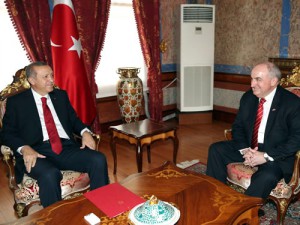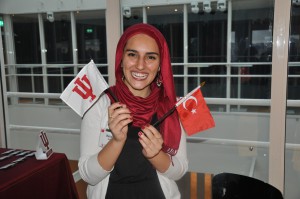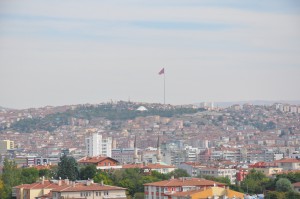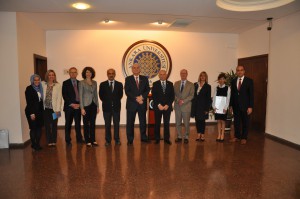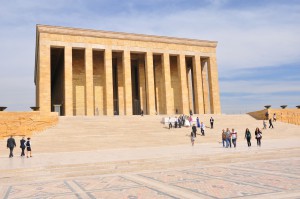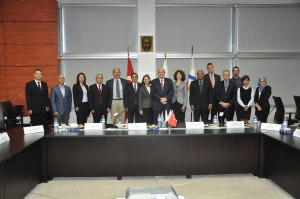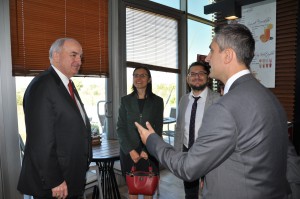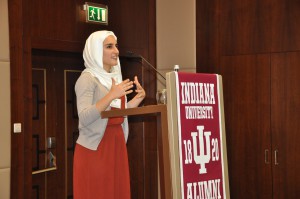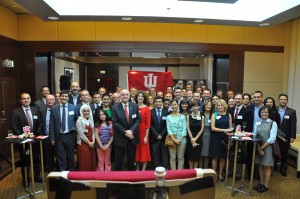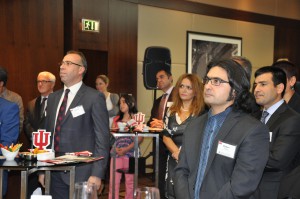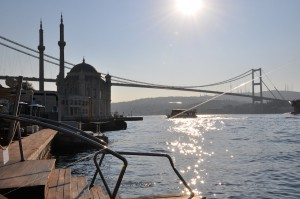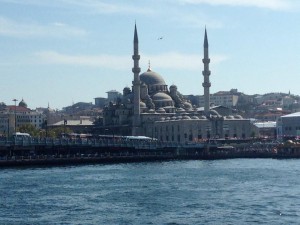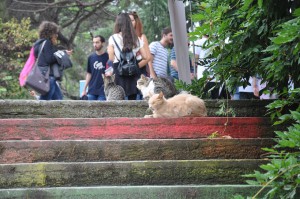An energizing and emotional finale
Approaching the final day of this historic and productive weeklong trip to Turkey, it was difficult to imagine how we might top the previous days’ activities. Moving at a mostly breakneck pace—first to Istanbul, then to Ankara and then back to Istanbul and its breathtaking Bosphorus waterway—members of the IU delegation barely had a chance to catch their breath—or, in the case of IU President McRobbie, who led most of the discussions here, regain his voice. The delegation spent the week working toward potential partnerships with Turkey’s top universities, met with officials at the country’s leading government agencies and reestablished ties with IU’s many successful Turkish alumni.
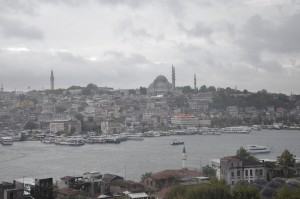
View of Istanbul and the Bosphorus from the SALT Galata building, located in the city’s Karaköy neighborhood.
The busy itinerary reflected IU’s remarkable level of engagement in a country so culturally, economically, historically and—as recent events in the Middle East have indicated—politically important to the world. The schedule also suggested the university’s determination to become more active and engaged here, through identifying promising new exchange programs for IU faculty and students to teach and study abroad and exploring opportunities to open IU’s third global gateway office (in addition to facilities in Beijing and New Delhi). A new gateway would serve as a hub for university-led activities in Turkey, including conferences, meetings, receptions, symposia, workshops and other events.
As President McRobbie said on several occasions during our meetings here, few, if any, U.S. colleges and universities have been as engaged in Turkey as IU, and a new global gateway would serve to bring IU and Turkey even closer together.
A Hoosier family at the head of state
Our last full day in Istanbul would offer perhaps the strongest confirmation of IU’s close connections to Turkey and the major impact it has had here.
On Saturday afternoon, McRobbie and IU First Lady Laurie Burns McRobbie met with the recently elected president of Turkey, Recep Tayyip Erdoğan. Joining them were two of Erdoğan’s three children who graduated from IU, daughters Esra and Sümeyye.
Esra Erdoğan (sociology) and her youngest brother, Bilal (political science and economics), both earned bachelor’s degrees from IU Bloomington’s College of Arts and Sciences. Sümeyye, who focused her collegiate studies on sociology and policy, is a graduate of IU’s School of Public and Environmental Affairs.
President Erdoğan, who was sworn in as president last month after more than a decade as prime minister, and his wife, Emine, both visited IU’s Bloomington campus when the former was prime minister.
Erdoğan’s meeting with the McRobbies in Istanbul came at the close of his own busy week. On Thursday, President Obama spoke to Erdoğan from Air Force One about the threat posed by ISIS in Iraq and Syria. Shortly thereafter, Erdoğan would meet Vice President Joe Biden in person in New York, where world leaders gathered for the opening of the United Nations General Assembly.
At Saturday’s meeting, though, the focus was mostly on Erdoğan’s two daughters, who were eager to share their fond memories of IU.
The impact of IU’s Istanbul alumni
Now that I have a few presidential trips under my belt, I can honestly report that there’s truly no better way to wrap up a trip than having the opportunity to meet with IU’s inspirational international alumni.
Saturday evening at the architecturally and visually stunning SALT Galata cultural building, located within Istanbul’s commercial Karaköy neighborhood, IU graduates living and working in Turkey’s largest city came together to meet President and First Lady McRobbie and other members of the IU delegation, and to reestablish ties with their alma mater.
In attendance at the special reception at SALT was Erdal Yildirim, who earned his master’s degree in philanthropic studies in 2005 from what is now known as the IU Lilly Family School of Philanthropy. Today, Yildirim serves as president of the Vehbi Koc Foundation, one of the largest non-governmental charitable organizations in Turkey and the country’s first private foundation operating in the fields of education, health, art and culture. Under his leadership, the Koc Foundation has made a number of major contributions to Turkey’s development, including the establishment of elementary schools and hospitals all across Turkey.
In recognition of his outstanding accomplishments in nonprofit management and philanthropy—as well as his assistance in furthering IU’s engagement efforts in Turkey—McRobbie presented Yildirim with IU’s Thomas Hart Benton Medallion, given to individuals who have achieved a level of distinction in public office or service and have exemplified the values of IU.

McRobbie presents the Thomas Hart Benton Medallion to IU alumnus Erdal Yildirim, the general manager of the Vehbi Koc Foundation.
Before and after the medal presentation, numerous alumni expressed their appreciation to McRobbie for making this historic trip to Turkey, and how proud they were to learn of IU’s efforts this week to establish stronger ties in their home country.
In turn, McRobbie praised IU’s Turkish alumni for the remarkable successes they’ve had since leaving IU and shared, on behalf of the entire IU global community, his gratitude for their great dedication to and support of the university.
“You are part of the spirit of Indiana University, and your successes are the university’s successes,” he said.
Goodbye and thank you, Turkey
With the alumni gathering in Istanbul, IU’s time in Turkey drew to a heartening and emotional close.
This busy and productive week will have a tangible effect, enabling more IU students to travel to Turkey to learn its languages and study its past and present culture and history. The week also brought IU one sizeable step closer to opening a permanent global gateway office in Turkey and approaching its goal of becoming the nation’s preeminent center for Turkish studies.
Admittedly, it will be difficult to leave our scenic surroundings, the warm hospitality we encountered everywhere we went, the incredible food and culture, and, especially, the new and old friends we met on our weeklong travels.
Already, I have what I’m calling the Bosphorus blues.
Still, our time in Turkey was nothing but uplifting and inspiring. Indeed, standing at the crossroads between Europe and Asia showed us that the spirit of IU is strong in Istanbul, in Ankara and all across this important part of the world, where IU promises to be increasingly engaged in the months and years ahead.
Thank you for reading, and to all of our Turkish friends, we look forward to seeing you again soon!
Tags: Ankara, Bilal Erdoğan, College of Arts and Sciences, Erdal Yildirim, Erdoğan family, Esra Erdoğan, Istanbul, IU Global Gateway Network, Laurie Burns McRobbie, Lilly Family School of Philanthropy, Michael A. McRobbie, Recep Tayyip Erdoğan, School of Public and Environmental Affairs, Sümeyye Erdoğan, Thomas Hart Benton Medallion, Turkey, Vehbi Koc Foundation
A memorable and inspiring experience
The following guest post was written by Rahaf Safi, who served as IU’s presidential intern in 2013-14 and accompanied members of the IU delegation on the trip to Turkey. Additional biographical information on Safi is included below.
Since graduating from Indiana University in the spring, I moved to Jordan to provide support for organizations aiding Syrian refugees. When IU President McRobbie asked me to join his delegation to Turkey, I was thrilled to take a break from the hot desert to travel to Istanbul but mostly excited at the chance to reconnect with IU. As a presidential intern, I had the opportunity to prepare materials for the delegation, all while wondering how these international visits were impacting the university. Spending this past week with the IU delegation has proved an experience of its own kind.
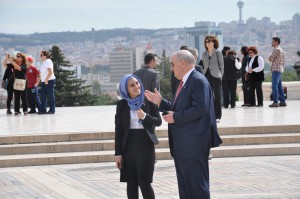
Rahaf Safi shares a moment with IU President Michael McRobbie at Anitkabir, the mausoleum of Turkish Republic founder Mustafa Kemal Atatürk.
IU has a strong history of international engagement. From the number of languages offered, to the cultural centers on campus and range of study abroad experiences it makes available to students, IU makes it easy to discover the world. But what I found especially intriguing, was just how prevalent IU is in every corner of the world.
As a member of the IU delegation, I had the chance to sit in on almost every meeting in Istanbul and Ankara to see how universities partner to enhance their students’ experience by providing study abroad or student exchange opportunities. In our increasingly interconnected world, studying abroad is an essential part of a college education. While any student could attend a class or read a book on Ottoman history or modern politics in Turkey, traveling to Turkey provides a special opportunity to experience both history and modernization here through direct involvement with the culture, including visiting historical sites, dining at local restaurants and interacting with locals.
For me personally, what has impacted me the most, and caused me to grow, is learning how to interact with someone who doesn’t speak my language, running around a city feeling a little lost and learning how to appreciate my own hybrid culture. The world felt more open and less intimidating after I had the chance to study abroad in Senegal and Bosnia. That experience prepared me to move outside of the U.S. and made the organization I currently work for excited to see that I had travel experience and immersion in another country.
My favorite parts of the trip to Turkey came when I would discover, in many of our meetings, how many IU alumni were participating in different parts of Turkish society. This week, IU hosted alumni receptions both in Ankara and Turkey. The alumni graciously welcomed our presence, and it was unbelievable to see the immense support and pride they have for IU.
I especially enjoyed hearing their memories of IU, and I was excited to see how proud the Turkish alumni are of the university and of being Hoosiers. They would greet President McRobbie and First Lady Laurie McRobbie with warm and spirited smiles, sharing how thrilled they were by IU’s visit to Turkey. Their individual backgrounds and courses of study at IU were so diverse that it felt like a “mini IU” was present in Turkey. Every school on the Bloomington campus—and many from the Indianapolis campus—were represented.
Although it felt odd to introduce myself as a recent graduate, I felt inspired and hopeful about my future after interacting with many successful alumni who credited their achievements to their time at IU. The fondness of their IU education and the impact it had on their life and career made me feel energetic as I considered my own future.
My time at IU has prepared me for my work in the public sector, but it also has given me the confidence that wherever I go the door swings open, and waiting to greet me are energetic IU alumni. I am excited to learn about where President McRobbie and the delegation will go next. It has been an honor to be invited to assist with the trip, and I am grateful for the opportunity to join the IU delegation in Turkey.
About Rahaf Safi:
Rahaf Safi graduated from Indiana University in May 2014 with a Bachelor of Arts in political science and philosophy and a certificate from the Political and Civic Engagement program. She served as IU’s presidential intern in 2013-14 with a focus on initiatives related to IU’s international strategic partnerships and the School of Global and International Studies.
In 2014, she was a joint recipient of the Herman B Wells Senior Recognition Award, IU Bloomington’s top academic award for undergraduates. The award is given to an outstanding senior who has excelled academically and has established himself or herself as a leader within the IU community.
In April 2013, she was awarded a prestigious Truman Scholarship, one of only 62 U.S. students to receive an award that recognizes outstanding student leaders who are committed to public service. Deeply involved in civic activities, she founded and served as president of the IU chapter of Oxfam America, an organization dedicated to finding solutions to global hunger, poverty and injustice. She was an intern during the summer of 2013 with the Association of Female Jurists in Dakar, Senegal, and studied at the Université Cheikh Anta Diop in Dakar. She was also an associate justice of the IU Supreme Court and represented the court on the Commission on Multicultural Understanding.
The Wells Senior Recognition Award recognizes excellence in academic achievement and excellence of contribution to the campus community through leadership and participation in campus activities. It is the campus’s top academic award for undergraduates.
Tags: Ankara, Bosnia, Istanbul, IU Alumni Association, IU presidential intern, Jordan, Michael A. McRobbie, Rahaf Safi, Senegal, Syria, Truman Scholarship, Turkey
Ankara: A uniquely intellectual city
The more you drive around Ankara, the more you begin to fully appreciate the vastness and vibrancy of Turkey’s capital and second-largest city.
Although Ankara, with its barren hills, bright lights and modern-style skyscrapers, offers a dramatically different cityscape architecturally and geographically from Istanbul’s historic peninsula, it possesses its own distinctive energy that is equally emblematic of modern-day Turkey and its goals for the future.
The home of state government and—with its strategic location at the center of Turkey’s highway and railway networks—an important crossroads of commerce, Ankara is a uniquely intellectual city, a fact further evidenced by the numerous colleges and universities that operate here. Those institutions, including two impressive schools (one public, one private) with which members of the IU delegation met today, are increasingly driving the development of highly trained human capital in Turkey in order to help this historic and strategically important nation fully realize its economic potential in the 21st century.
A proud partner
Friday morning delivered the delegation to Ankara University, which was founded in 1946 as the first higher education institution of the Turkish Republic, under the country’s legendary first president, Mustafa Kemal Atatürk. Ankara’s buildings reflect a German architectural style, the direct result of numerous Jewish architects finding a safe home at the university after World War II. (As IU Vice President David Zaret noted, many successful IU programs were constructed during this same time, when IU’s legendary 11th president Herman B Wells offered similar sanctuary in Bloomington to many of Europe’s finest young artists, musicians and scholars.)
Despite its relative youth, Ankara is steeped in tradition. Many of its schools (called faculties in Turkey), including law, agriculture, humanities, medicine and political science, were established decades before the university’s inception. What’s more, the symbol of this modern university is a sun disc, belonging to the ancient Hittite civilization, which reached its height during the mid-14th century BC when it ruled most of Asia Minor. This bronze symbol, believed to have been developed 300 years prior to the Hittite settlement in Anatolia, was most commonly used more than 4,000 years ago in religious ceremonies.
Today, Ankara boasts a total enrollment of 60,000 students and 3,500 academic staff, and it serves as a key partner for IU’s Turkish Flagship Center, the only federally funded center of its kind in the U.S., in providing IU students with opportunities to travel here to study Turkish and live with host families. Two IU students studied at Ankara last year, and two more students are currently in residence.
The university’s primary institutional partner at Ankara is TOMER, the Center for Applied Turkish and Foreign Languages Research, which has 11 branches across Turkey. Founded 30 years ago, TOMER has periodically delivered Turkish instructors to IU, one of its select few U.S. partners, for short-term educational programs, and it has set its sights, just like IU, on strengthening the global proficiency of its students by exposing them to study abroad activities at the world’s best universities.
To this end, representatives from both IU and Ankara agreed that the Turkish Flagship Center-TOMER partnership might point the way to future quality collaboration.
Sharing IU’s standpoint, Zaret said, “We are immensely proud of our flagship program, and we hope to see even more of our students take advantage of the opportunities made possible through our strong partnership.”
An awe-inspiring detour
After visiting Ankara University, it was only fitting that the delegation use what few spare minutes it had before its next series of meetings to make a quick, unscheduled detour to Anitkabir, the mausoleum of Mustafa Kemal Atatürk.
Adorned with remarkably detailed marble columns, statues and sculptures, and 10 towers situated in a symmetrical arrangement, Anitkabir, which literally means “memorial tomb,” was designed to reflect the ideals that influenced Turkish independence and the creation of the Turkish Republic.
Walking the Road of Lions to the massive Ceremonial Plaza, which offered a simply stunning view of the city, and finally into the Hall of Honor, the location of Atatürk’s tomb, with its astonishing pyramidal ceiling lined with gold mosaics, it was impossible not to be awestruck by one of Turkey’s most impressive engineering feats and the most striking symbol we’d yet witnessed of the contemporary Turkey in which IU seeks to become increasingly engaged in the years to come.
Meeting the demand for higher education
Finally, it was on to the TOBB University of Economics and Technology, the first private university the IU delegation has visited on this weeklong trip, and Turkey’s first university to offer cooperative education that combines classroom education with practical business experience.
Only 10 years old, TOBB is already playing a major role in addressing an enormous demand for higher education in Turkey, where around half of the population is under 25 years of age.
To meet this demand, TOBB has quickly established six undergraduate schools (in engineering, economics, science and literature, art and design, law and medicine) and two grad schools (natural and applied sciences, social sciences), plus a technical center that opened just last year and includes more than 100 research and education laboratories.
Beginning their sophomore year, TOBB students are placed in companies and institutions to complete three years of practical training. The university counts among its connections and supporters around 2,000 businesses and industries.
As TOBB seeks ways to continue its rapid growth, its representatives were especially interested to hear about IU’s considerable and longstanding strengths in business, the medical and life sciences, and foreign language instruction. (As IU President Michael McRobbie is fond of noting, among U.S. colleges and universities, IU teaches the most foreign languages, between 70-80 in any given year.) Additionally, as TOBB looks to become more plugged into promising growth areas around the world, its leading faculty were pleased to hear McRobbie describe Indiana’s strong pro-business climate and particularly vibrant health and life sciences sector.
Those representatives included Janamitra “Dev” Devan, who currently serves as a strategic advisor to TOBB President M. Rifat Hisarcıklıoğlu, as well as senior advisor to the chair of the Turkish B20 and to TEPAV, Turkey’s premier think tank.
Dev, who formerly served as vice president and head of network of the World Bank Group where he managed a $10 billion portfolio, received his Ph.D. in business economics and international business from IU’s Kelley School of Business.
In addition to his educational training, Dev clearly picked up, during his time in Bloomington, a personal recognition of IU’s many and diverse strengths as a leader in education, research and international engagement.
“It’s almost intimidating what IU has,” he said.
None of us could’ve said it better on a day in which we all acquired a much greater understanding of both the challenges and opportunities facing this fascinating city and country.
Tags: Anitkabir, Ankara, Ankara University, Center for Applied Turkish and Foreign Languages Research, David Zaret, Hittite, IU Turkish Flagship Center, Janamitra "Dev" Devan, M. Rifat Hisarcıklıoğlu, Michael A. McRobbie, Mustafa Kemal Atatürk, TOBB University of Economics and Technology, TOMER, Turkey
Finding new partners, reconnecting with old friends in Ankara
One of the first things you notice as you motor up the hills leading to the sprawling 11,000-acre campus of Middle East Technical University is the forest alongside the main road, which wouldn’t be quite so noticeable if you hadn’t previously discovered that the landscape of Ankara, the capital city of Turkey, is largely brown and treeless.
The trees, several of which, we later learned, were planted by METU faculty and students, reflect the remarkable growth of a university which, since its inception as a state university in 1956, has become one of Turkey’s top — and most internationally focused — institutions of higher education.
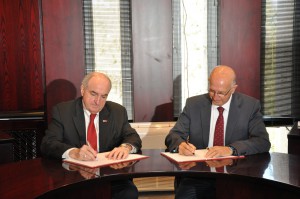
IU President Michael A. McRobbie and METU President Ahmet Acar sign an agreement between their universities.
With more than 110,000 alumni, 24,000 students, 1,800 international students, 1,200 full-time faculty, 43 undergraduate degree programs, 24 interdisciplinary research centers and one major technology park (more on that in a bit), METU has also developed into one of Turkey’s most intensely competitive universities, with most of its departments accepting only the top 1 percent of the approximately 1.5 million applicants taking Turkey’s National University Entrance Examination.
Today, it is widely recognized as the leading university in Turkey in terms of depth and breadth of international ties and the amount of funds it generates from a wide range of international research projects.
A new partnership filled with potential
On Thursday, IU President Michael A. McRobbie and members of his delegation arrived here at METU to learn more about this accomplished university, talk about IU’s plans to enhance its longstanding engagement in Turkey and, most importantly, sign a new agreement of friendship and cooperation between the two institutions, which, not surprisingly, share a number of common interests and objectives.
While IU and METU have already collaborated in recent years on a number of successful projects, the new agreement will enable even greater opportunities for research and study for students and faculty at both institutions, and today’s productive discussions signaled great potential for collaborative exchanges in academic disciplines in which IU possesses considerable strengths, including, among other areas, business and economics, computer science and informatics, public and environmental affairs, and the social and physical sciences.
From a singularly IU perspective, the agreement, like that signed with Boğaziçi University in Istanbul several days ago, will also dramatically enhance the university’s historic presence in Turkey, which dates back 70 years, and its intention to markedly expand its educational and research connections all across this vitally important region of the world.
“I’m sure there will be many good synergies between our two universities,” METU President Ahmet Acar told members of the IU delegation as the group prepared to depart for yet another striking indication of METU’s prominence and pursuit of greater research productivity: the ODTU Teknokent-METU Technopark.
Initially conceived in the 1980s, launched with the support of a small business administration in Turkey and continually developed throughout the ensuing decades, the Technopark lives up to its METU-drawn moniker as “the first, biggest and most innovative science and technology park of Turkey.” This major business incubator has spawned numerous industry-university collaborations aimed at research, software and technology development, and it boasts a most impressive scale of transferring new technologies to the global marketplace.
What’s more, the Technopark offered an ideal and inspiring location for our final activity at METU: a working lunch with President Acar and 15 of his faculty colleagues. Amazingly, more than half of our hosts were graduates of IU, further reflecting the remarkably strong connections between IU and METU and the strong potential inherent in this new and exciting partnership.
Understanding and making an impact in contemporary Turkey
From METU, the delegation traveled back down the Ankara hillside to a meeting at Turkey’s Higher Education Council, known as Yükseköğretim Kurulu Başkanlığı or YÖK, which governs the country’s university system and manages educational initiatives like the Mevlana program, which enabled IU’s new agreement with Boğaziçi University.
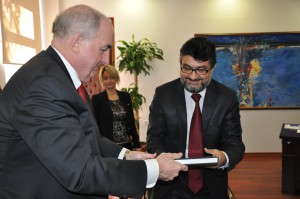
IU President McRobbie presents a gift to Şaban Çalış, deputy chair of Turkey’s Higher Education Council, known as YÖK.
While at YÖK, IU President McRobbie and council Deputy Chairman Şaban Çalış discussed IU’s commitment to building upon its long and successful Turkish studies programs to develop greater faculty expertise and resources devoted to modern-day Turkey, the extraordinary transformation that has taken place here over the last several decades and Turkey’s strategically important role in current global affairs. The two also chatted about IU’s plan to open its new global gateway facility in Istanbul, a well-received topic at every meeting we’ve attended thus far, and how their respective institutions might work together in the future to assist Turkish society through the development of more advanced human capital across the country.
From there, it was a short drive to the Ministry of Foreign Affairs, where similar talks were held between McRobbie, Deputy Minister Ali Naci Koru and their respective colleagues. The deputy minister seemed especially pleased to learn about IU’s significant pre-existing relationship and newly signed partnership with METU, its long history of providing a warm and welcoming place for students from Turkey and around central Asia, and the university’s ambitious vision to become America’s pre-eminent center for Turkish studies, both past and present.
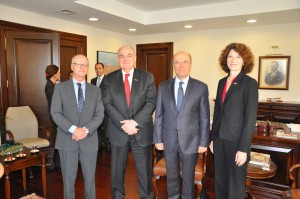
From left: IU Vice President David Zaret, IU President McRobbie, Turkish Deputy Minister Ali Naci Koru and IU first lady Laurie Burns McRobbie.
Fatih Yildiz, director of human resources and management ministry of foreign affairs, summed up the meeting nicely: “You have a vision for Turkey, and we have a vision for how Turkey should be developed. Our role now is to mesh these two visions.”
IU’s greatest resource: its alumni
Of course, behind every successful partnership, program and vision are people, and nowhere was this more evident than at the IU delegation’s final activity of a busy day: a reception for IU alumni living and working in Ankara.
The number of IU alumni in Turkey continues to grow, with about 100 Turkish students arriving at the university’s campuses each year. Indeed, Turkey consistently ranks among the top 10 nations of origin among IU’s international students, and that’s not counting the many other Turkish scholars and dignitaries who also come to teach, lecture and learn at IU.
More impressive than the sheer numbers, however, are the tremendous successes of IU’s Turkish alumni and their remarkable achievements across the entire spectrum of society here in this dynamic country, including the arts, business, communications, education, government, health care, philanthropy and more. And all of this is to say nothing of their exceptional dedication and loyalty to IU.
Tonight’s reception included welcoming remarks by IU Foundation Director of International Alumni Relations Fred Perry, an IU update by President McRobbie and an inspiring address from former IU presidential intern and recent graduate Rahaf Safi, who spoke passionately about her strong belief in the power of education and of public service. (Safi has joined the delegation on this trip to Turkey, and I hope you will get to hear directly from her in this blog space soon.)
On a strictly personal note, I had the opportunity to meet up with an old friend—and someone I suspect many folks back home in Bloomington will remember — Metin Ayvazoglu, who after opening the popular Turkuaz Café restaurant more than a decade ago, went on to earn his master’s degree from IU’s top-ranked School of Public and Environmental Affairs. Today, he is engaged in Turkish government and has designs on running for a seat in Parliament.
All in all, the reception was a terrific close to an energizing and eventful day, in which new partnerships were formed and old connections were re-established, all of which will almost certainly result in greater engagement in Turkey in the years to come.
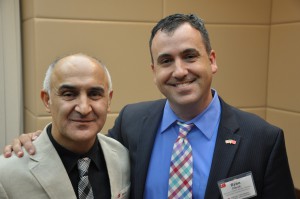
Yours truly, on the right, with friend and IU alumnus Metin Ayvazoglu, former owner of Bloomington’s Turkuaz Café.
Tags: Ahmet Acar, Ali Naci Koru, Ankara, Bogazici University, Fatih Yildiz, Fred Perry, IU Alumni Association, Metin Ayvazoglu, METU, METU Technopark, Michael A. McRobbie, Middle East Technical University, Ministry of Foreign Affairs, Rahaf Safi, Şaban Çalış, School of Public and Environmental Affairs, Turkey, Turkey Higher Education Council, YÖK
The marvel of modern Turkey
Admittedly, it’s a strange sensation to marvel each morning at the stunning Istanbul skyline and glistening Bosphorus waterway, while simultaneously reading the daily newspaper, which, in recent days, has chronicled the launching of airstrikes by a U.S.-led coalition in neighboring Syria against the Islamic State, the mixed international reaction to the new military campaign and the massive streaming of Syrian refugees (more than 150,000 over the last week, it was just reported) across the Syrian-Turkish border.
As if experiencing this dynamic city’s culture and history wasn’t enough, members of the IU delegation have traveled here, to Turkey’s largest metropolis, at a time when the entire world is focused on the strategic significance of a nation that, recent electoral and constitutional challenges aside, remains the clear economic, military and political power in the region.
Indeed, current developments have demonstrated that, despite a remarkable history that spans the world’s most ancient civilizations, cultures and legendary empires, Turkey is, in 2014, a modern and ever-changing country.
Philanthropy in action
The mission of the Vehbi Koc Foundation, the first, large-scale private foundation in Turkey and now one of the country’s biggest non-governmental charitable organizations, reflects the country’s dynamic stature.
Established in 1969 by Vehbi Koc, a renowned Turkish entrepreneur and philanthropist, the foundation strives to improve conditions in Turkey through a focus on education, culture and health care. Its efforts have resulted in the establishment of Koc University, Koc School and many elementary schools across the country, as well as various dormitories, hospitals, libraries and museums. The foundation has also awarded scholarships to thousands of students in order to create equal opportunities in education.
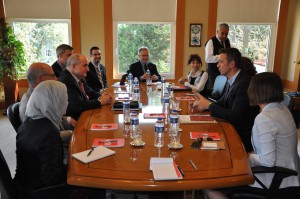
Members of the IU delegation meet with alumnus and president of the Vehbi Koc Foundation, Erdal Yildirim, second from right.
On Wednesday morning, members of the IU delegation had the opportunity to visit the Koc Foundation and reconnect with its president, Erdal Yildirim, who received his master’s degree in philanthropic studies from IU and, later this week at an alumni gathering, will be awarded with the university’s prestigious Thomas Hart Benton Medallion in recognition of his outstanding accomplishments in nonprofit management and philanthropy over his career in Turkey and around the globe.
In addition to hearing about past, present and future projects at the Koc Foundation, IU President Michael A. McRobbie and Vice President David Zaret shared news of recent major developments at IU, including the establishment of a new School of Global and International Studies, which now houses all of the university’s acclaimed international resources and faculty expertise; a renewed emphasis on enhancing teaching and research capacity in modern Turkish studies; and a plan to create a new global gateway office in Istanbul, which will serve as a hub of university activity both here in Turkey and across the central Asian region.
“Istanbul is a priority,” Zaret said. “Culturally, it has a rich heritage, and logistically, it’s the perfect regional hub for our large and successful programs in central Asia, the Middle East and North Africa.”
Given his background and experience, Yildirim, who assumed his current role 17 years ago, talked openly about the challenge of philanthropic governance in Turkey, including new foundations struggling to determine how best to manage funds, design giving programs that are both effective and sustainable, and transition successful business executives from the for-profit to the nonprofit sector.
“We have rich philanthropic traditions,” he said, “but I strongly believe we should be doing more for philanthropy in Turkey, where there will be young people working in this field for many years.”
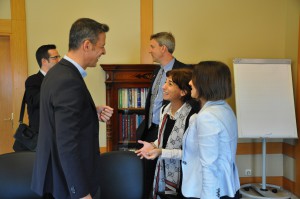
Vehbi Koc Foundation President Erdal Yildirim shares a laugh with Rita Koryan, IU director of international development and engagement.
In raising the issue of how to strengthen the support base for philanthropy in Turkey, Yildirim effectively set the stage for potential future discussions between Koc and IU’s Lilly Family School of Philanthropy, the first such school in the world, which is dedicated to increasing the understanding of philanthropy and improving its practice worldwide through research, teaching, training and civic engagement. He also suggested a promising path for educational programming and professional training that might help form the basis of meaningful activities at IU’s Istanbul gateway facility, for which the university hopes to soon identify a permanent location.
IU alumni and their impact
Listening to Yildirim talk, it was impossible not to be inspired by his passion and desire to build a better future for Turkey.
Ater leaving the Koc Foundation, McRobbie, Zaret and other members of the IU delegation spent an afternoon meeting with several other successful IU alumni, who, like Yildirim, are making a major impact in Istanbul, in such vital areas as academia, the arts, business and economics, government, media and philanthropy.
Indeed, their success offers a measure of what IU hopes to accomplish on trips like these and with its global partners, like the Koc Foundation today and Boğaziçi University yesterday, in the years to come.
Where there’s a Will
One final thought: You just never know whom you’ll run into while you’re in Turkey.
Just as they were about to depart the airport in Istanbul for two days of meetings in Ankara, members of the IU delegation made one last alumni connection, albeit one that was not on the schedule.
Suffice it to say, it was a slam dunk.
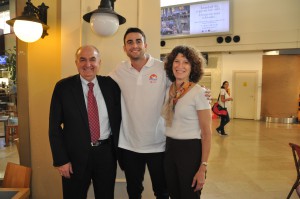
IU President Michael A. McRobbie and first lady Laurie McRobbie pose for a picture at the Istanbul airport with former IU basketball standout Will Sheehey (center).
Tags: Bogazici University, David Zaret, Erdal Yildirim, Istanbul, IU Global Gateway Network, IU international alumni, Lilly Family School of Philanthropy, Michael A. McRobbie, School of Global and International Studies, Syria, Turkey, Vehbi Koc Foundation, Will Sheehey
History, heritage and culture in Istanbul
To look out at the beautiful and busy Bosphorus strait here in the transcontinental city of Istanbul, Turkey’s largest city, is to be simply awestruck by the convergence of centuries upon centuries of history, heritage and culture.
For nearly 16 centuries in fact, this city, which straddles Europe and Asia, served as the epicenter of four empires: the Roman Empire (330-395), the Byzantine Empire (395-1204, 1261-1453), the Latin Empire (1204-1261) and the Ottoman Empire (1453-1922). Today, Istanbul is a buzzing, modern metropolis, its marvelously eclectic skyline dotted by mosques, cathedrals, towers and other historic structures, its bustling, hilly roads lined with cafes, restaurants, shops, street vendors and countless stray, but seemingly satisfied, cats.
It’s easy to see why the cats aren’t clawing to get out: Thus far, we’ve only been in this breathtaking city a day, and already it feels as if we’ve arrived at the center of this most important part of the world.
IU’s impact in Turkey
Indiana University’s connection to the historical and economic hub that is Turkey dates back more than 70 years. Currently, IU serves as the leading center in the U.S. for the study of Ottoman and modern Turkish language; is considered to be among the nation’s premier programs for the broader study of Turkish culture and history; and features the prestigious Turkish Flagship Center, the only federally funded program in this area.
Additionally, the university welcomes roughly 100 Turkish students to its campuses each year as well as a number of visiting scholars; continues to send its own faculty and students to Turkey to teach and study abroad; and boasts two alumni chapters — one in Istanbul and the other in the capital city of Ankara — that represent nearly 500 affiliated IU Turkish alumni. This all adds up to a major IU presence in this dynamic, strategically significant part of the world, one that few other U.S. universities, if any, can match.
Building bridges in Boğaziçi
As IU seeks to expand its impact in Istanbul, around Turkey and across the larger central Asian region, the university will rely on strategic relationships with institutions that share common academic goals and interests.
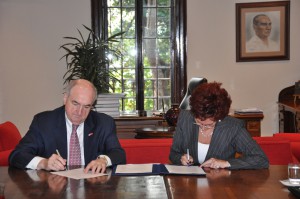
IU President Michael A. McRobbie and Gülay Barbarosoğlu, president of Boğaziçi University, sign a Mevlana agreement to foster exchanges between IU and Boğaziçi.
For nearly a dozen years, IU has had a partnership with Boğaziçi University in Istanbul, which just last year celebrated its 150th anniversary. Established in 1863 as Robert College, it was the first American institution of higher education to be founded outside the borders of the U.S.
In 1971, it was transformed into Boğaziçi University, a public research university that maintained its liberal arts education tradition and reputation as Turkey’s best English language instructional program. It is now one of Turkey’s top-ranked universities, with more than 13,000 students, 1,200 academic staff and a host of exceptional programs spanning the arts and humanities, natural, social and technical sciences, economics, education and engineering.
Located in the hills of the Bosphorus — with a stunning view of Asia from the shores of Europe (and, yes, a cadre of well-cared-for cats) — Boğaziçi shares IU’s commitment to strengthening the global competencies of its faculty and students through various exchange programs. Each year, the university sends about 500 of its students overseas and welcomes an almost equal number of international students to its campus. About one in five of the university’s faculty, which includes more than a few IU alumni, came to the campus from foreign nations. (Coincidentally, about the same percentage of IU’s tenured faculty were born overseas.)
In recent years, IU and Boğaziçi have established a number of relationships between faculty and research programs in a variety of areas, including anthropology, Turkish studies and philanthropic studies.
On Tuesday, IU President Michael A. McRobbie, the first standing IU president to visit Turkey in nearly 60 years, and his counterpart at Boğaziçi University, professor Gülay Barbarosoğlu, launched the next era in this productive partnership by inking a historic Mevlana agreement. The agreement, the first of its kind signed by Boğaziçi with any other university, is part of a Turkish governmental program to provide funding for student and faculty exchanges between Turkey’s higher education institutions and their counterparts around world.
A new global gateway
IU isn’t resting on its past successes in Turkey. Instead, the university hopes to substantially expand its presence in Istanbul — and elevate Turkish studies at IU to international pre-eminence — through the establishment of a third global gateway center, for which planning is already underway. (The other two are in Beijing and just outside New Delhi.) The center will serve as a hub for IU activities in Turkey and provide faculty, staff, students and alumni, not just in this country but all across the central Asian region, with a prime gathering place to hold conferences, meetings, receptions, recruiting events, symposia and other specialized activities.
President Barbarosoğlu and her colleagues among the leadership at Boğaziçi University expressed their support for a new center that could facilitate what IU Vice President David Zaret described as “sustainable research collaborations” and more “innovative student programming” between IU and Boğaziçi.
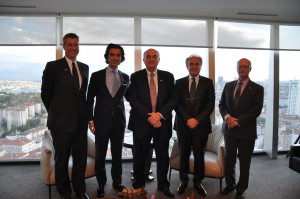
From left to right: Eric DeHaan, associate vice president for international development at IU Foundation, IU alumnus Ekrem Ozer, IU President Michael A. McRobbie, IU alumnus Melih Araz and IU Vice President for International Affairs David Zaret.
The new center — and IU’s overall efforts to enhance its Turkish studies program — also received strong support from U.S. Consul General Charles F. “Chuck” Hunter, with whom McRobbie, Zaret and members of the IU delegation met shortly after the agreement signing at Boğaziçi.
Hunter characterized higher education in Turkey as a “booming business” and indicated that the number of universities in the country has more than doubled in just the past seven years.
“It’s astonishing how much proliferation there has been in higher ed,” he said, adding that he welcomed the “opportunity for another frontline institution like IU” to establish a permanent presence in Turkey to raise the nation’s educational capacity and generate greater human capital.
“There will be a lot to keep that office busy,” IU alumnus Melih Araz told members of the IU delegation later in the afternoon. Araz, who received his MBA from the Kelley School of Business in 1972, served as a longtime executive at Citibank in Istanbul and is now managing director of Ata Invest, a full-service securities firm with offices in New York, Istanbul and Dubai.
In his 20th-floor office overlooking the beautiful Bosphorus and architecturally amazing Istanbul city scape, Araz reminisced about his days at IU, where he and his wife lived during their first two years of marriage; the Kelley School; Hoosier football and basketball; and Olympian Mark Spitz. Speaking of his travels from Istanbul to Indiana, he said: “It took my wife and I three days to get to Bloomington … in those days, the U.S. was far, far away.”
Today, though, Istanbul and Indiana never seemed closer.
Tags: Bogazici University, Bosphorus, Charles F. Hunter, David Zaret, Ekrem Ozer, Gulay Barbarosoglu, Istanbul, IU Global Gateway Network, IU Turkish Flagship Center, Melih Araz, Michael A. McRobbie, Turkey
From crossroads to crossroads
Beginning Sunday, an Indiana University delegation, led by IU President Michael A. McRobbie, will leave Indiana for a week-long trip to Turkey, one of the largest and most prominent nations in the Middle East and a country commonly referred to as the “crossroads” between Europe and Asia.
Turkey is also a country in which IU’s connections run deep. For more than 70 years, IU has played a major role in the teaching and researching of Turkish and Turkic languages and culture, and students and scholars have come to IU from Turkey for decades to pursue educational opportunities and work with IU faculty, many of whom are now part of IU’s newly launched School of Global and International Studies. Indeed, Turkey consistently ranks among the top 10 nations of origin among IU’s international students.

IU students at a welcoming meeting hosted by the university’s Turkish Flagship Center, the only federally funded program in this area.
IU also boasts the prestigious Turkish Flagship Program, the only federally funded program in this area, which provides intensive instruction in Turkish and English to students studying in degree programs across the university and planning to pursue careers working in Turkey and the Middle East.
These and other programs are vital to IU’s overall international engagement efforts, which are designed to spark increased study abroad opportunities for IU students, generate new research collaborations for faculty and enhance IU’s presence in the most economically and culturally dynamic parts of the world.
Among the many highlights of the trip will be meetings in Istanbul and the capital of Turkey, Ankara, with prominent government officials, the heads of several of Turkey’s top universities and local leaders in education, philanthropy and business.
Additionally, the trip will provide McRobbie and members of the delegation the opportunity to reconnect with IU’s numerous Turkish alumni, many of whom have gone on to impressive careers in the public and private sectors of the principal diplomatic, economic and security power in the region. They include Erdal Yildirim, general manager of the Vehbi Koc Foundation, one of the country’s largest, non-governmental charitable organizations, who will receive IU’s Thomas Hart Benton Medallion in recognition of his outstanding accomplishments in nonprofit management and philanthropy.
McRobbie will be the first sitting IU present to visit Turkey since Herman B Wells traveled there in 1955. Joining him on the trip will be IU Vice President for International Affairs David Zaret and IU first lady Laurie Burns McRobbie.
And I’ll be there, too, delivering first-hand, real-time reports about our daily activities, sharing information about our strong and continually growing connections to this important part of the world and offering insights into the university’s efforts to further strengthen IU’s position as one of the nation’s most internationally focused universities.
I hope you will follow along and check in frequently as I share news, photos and updates, and please feel free to reach out to me directly with questions at rpiurek@iu.edu.
See you soon from Istanbul!
Tags: Ankara, David Zaret, Erdal Yildirim, Istanbul, Laurie Burns McRobbie, Michael A. McRobbie, Ryan Piurek, School of Global and International Studies, SGIS, Thomas Hart Benton Medallion, Turkey, Turkish Flagship Program, Vehbi Koc Foundation



